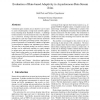Free Online Productivity Tools
i2Speak
i2Symbol
i2OCR
iTex2Img
iWeb2Print
iWeb2Shot
i2Type
iPdf2Split
iPdf2Merge
i2Bopomofo
i2Arabic
i2Style
i2Image
i2PDF
iLatex2Rtf
Sci2ools
137
click to vote
IPPS
2005
IEEE
2005
IEEE
Evaluation of Rate-Based Adaptivity in Asynchronous Data Stream Joins
Continuous query systems are an intuitive way for users to access streaming data in large-scale scientific applications containing many hundreds of streams. A challenge in these systems is to join streams in such a way that memory is conserved. Storing events that could not possibly participate in a join any longer wastes memory and limits scalability of the query processing system. This paper reports an experiment we conducted to validate an algorithm we developed for adaptive rate, adjustable join windows. We posit that a rate-based strategy can result in memory savings, can be sufficiently responsive to rapid changes in stream rates, and can execute with suitably low overhead. Based on the results, we conclude that the algorithm adds between 0.007% and 2.6% overhead, with significant gains in memory utilization possible depending on the particular workload. Key Words and Phrases: data-driven applications, grid computing, continuous query systems, data streams, database query pro...
Continuous Query Systems | Distributed And Parallel Computing | IPPS 2005 | Query Processing | Query Processing System |
Related Content
| Added | 25 Jun 2010 |
| Updated | 25 Jun 2010 |
| Type | Conference |
| Year | 2005 |
| Where | IPPS |
| Authors | Beth Plale, Nithya N. Vijayakumar |
Comments (0)

